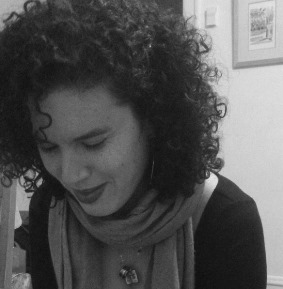Where I Eat
On TV, someone is selling the idea of buying by way of a happy family by way of a cleaning product. I want—, I say. Then your mouth on my mouth. Your mouth on my belly. And then. I was never good at being a girl. All those hands made dirty work. Once, my grandmother scooped the Tennessee soil, put it in my mouth. It tasted true. I wanted more. In my steepled city steeped in song, I pitied that christian god his labor. He made marrow and astonishment of us. We made bludgeon of him, bland bread of his son. My neighbor used to be a missionary. Now he spends days painting a bird pecking at the eyeballs of a dead girl. In the painting, you can only see the bird. See how the artist probes the light so the feathers shimmer. Beautiful, the TV mother says to each guest as the house burns down. She sashays through the parlor, stopping to nibble on a stuffed mushroom, dab sweat from the brow of a dignitary. Everything is a metaphor until the body abuts it. Even then. Metaphor with blood. Metaphor with teeth. Metaphor with epinephrine. I name each blow desire. Look how your hand revises my form. Extraordinary ability. Prodigal child. You leave and take your weather with you. I take your language to polish my wound, but rarely do I dare to mean anything at all. A poem is evidence of nothing. You cannot prosecute with a poem. I thought your violence made me good. I thought your desire made me beautiful though the signs chirping wanted all had your face. Maybe you’ve named me innocent after living so long in my mouth. I, for one, always fall in love with the person holding the pen. What will you bring me when I tell you what I’ve done? Lobster, slant of light, doilied petition, blond girl playing scales on the violin? Oh, I will reach right through her. I will extract her best music.
Credit
Copyright © 2018 by Claire Schwartz. Originally published in Poem-a-Day on August 10, 2018, by the Academy of American Poets.
About this Poem
“Is the poem always I’s alibi? If I says it beautifully is saying it also a way of flaunting I’s beauty? (Look what I am worth. Do you like me like this?) Question: What is the circumference of a white woman’s wail? Answer: A nation. If this body is the place from which I speak—I speaks—(how) can I turn language to expose the violence of I’s testimony? (How) can I be otherwise? You don’t need to like me. Something about love is at stake. Something about beauty.”
—Claire Schwartz
Date Published
08/10/2018

